- Home
- Jean M. Auel
The Valley of Horses Page 7
The Valley of Horses Read online
Page 7
I’ve got to stop this, she scolded herself, wiping tears away with the back of her hand. I should be glad you have people who love you, Durc. And when you’re older, Ura will come and be your mate. Oda promised to train her to be a good woman for you. Ura isn’t deformed, either. She’s just different, like you. I wonder, will I ever find a mate?
Ayla jumped up to check on her meal, moving just to be doing something to take her mind off her thoughts. The meat was more rare than she liked it, but she decided it was done enough. The wild carrots, small and pale yellow, were tender and had a sweet tangy taste. She missed the salt that had always been available near the inland sea, but hunger provided the right seasoning. She let the rest of the hare cook a little longer while she finished scraping the skin, feeling better after she ate.
The sun was high when she decided to investigate the hole in the wall. She stripped and swam across the river, scrambling up the tree roots to climb out of the deep water. It was difficult scaling the nearly vertical wall, making her wonder if it was worthwhile even if she found a cave. She was disappointed anyway when she reached a narrow ledge in front of the dark hole and found it was hardly more than a depression in the rock. The scat of hyena in a shaded corner let her know there must be an easier way down from the steppes, but there wasn’t room for anything much larger.
She turned to start down, then turned farther. Downstream and slightly lower on the other wall, she could see the top of the rock barrier that jutted toward the bend of the river. It was a broad ledge, and at the back of it there appeared to be another hole in the face of the cliff, a much deeper hole. From her vantage point, she saw a steep but possible way up. Her heart was beating with excitement. If it was a cave of any size at all, she’d have a dry place to spend the night. About halfway down, she jumped into the river, eager to investigate.
I must have passed by it on the way down last night, she thought as she started up. It was just too dark to see. She remembered, then, that an unknown cave should always be approached with caution, and she returned for her sling and a few rocks.
Though she had very carefully felt her way down, in good light she found she didn’t need handholds. Over the millennia, the river had cut sharper into the opposite bank; the wall on this side wasn’t as steep. As she neared the ledge, Ayla held her sling ready and advanced with caution.
All her senses were alert. She listened for the sounds of breathing or small scufflings; looked to see if there were any telltale signs of recent habitation; smelled the air for the distinctive odors of carnivorous animals, or fresh scat, or gamy meat, opening her mouth to allow taste buds to help catch the scent; let her bare skin detect any sense of warmth coming out of the cave; and allowed intuition to guide her as she noiselessly approached the opening. She stayed close to the wall, crept up to the dark hole, and looked in.
She saw nothing.
The opening, facing the southwest, was small. The top cleared her head, but she could reach her hand up and touch it. The floor sloped down at the entrance, then leveled out. Loess, blown in on the wind, and debris carried in by animals that had used the cave in the past had built up a layer of soil. Originally uneven and rocky, the floor of the cave had a dry, hard-packed, earth surface.
As she peered around the edge, Ayla could detect no sign that the cave had been used recently. She slipped in, silently, noticing how cool it was compared with the hot sunny ledge, and waited for her eyes to adjust to the dim interior. There was more light in the cave than she expected, and when she moved in farther, she saw sunlight through a hole above the entrance and understood why. She also understood a more practical value to the hole. It would allow smoke to get out without filling the upper reaches of the cave, a distinct advantage.
Once her eyes adjusted, she discovered she could see surprisingly well. Light coming in was an advantage, too. The cave was not large but not small either. The walls angled back from the entrance, widening until they came to a fairly straight back wall. The general shape was roughly triangular, with the apex at the mouth and the east wall longer than the west. The darkest place was the east back corner; the place to investigate first.
She crept slowly along the east wall, watching for cracks or passageways that could lead to deeper recesses holding hidden menaces. Near the dark corner, rock cleaved from the walls lay on the floor in a jumbled heap. She climbed the rocks, felt a shelf, and emptiness beyond it.
She considered getting a torch, then changed her mind. She hadn’t heard, smelled, or felt any signs of life, and she could see a little way in. Putting her sling and stones in one hand, wishing she had stopped to put on her wrap so she would have a place to put her weapons, she hoisted herself up on the shelf.
The dark opening was low; she had to stoop to move inside. But it was only a recess that ended with the roof sloping to meet the floor of the niche. At the back was a pile of bones. She reached for one, then climbed down and worked her way along the back wall, and along the west wall back to the entrance. It was a blind cave, and, except for the small niche, had no other chambers or tunnels leading to unknown places. It felt snug and secure.
Ayla shaded her eyes against the bright sunlight as she walked out to the far edge of the cave’s terrace and looked around. She was standing on top of the jutting wall. Below her on the right was the pile of driftwood and bones, and the rocky beach. To the left, she could see far down the valley. In the distance, the river turned south again, curving around the base of the steep opposite wall, while the left wall had flattened into steppes.
She examined the bone in her hand. It was the long legbone of a giant deer, aged and dry, with teeth marks clearly imprinted where it had been split to get at the marrow. The pattern of teeth, the way the bone had been gnawed, looked familiar, and yet not. It had been made by a feline, she was sure. She knew carnivores, better than anyone in the clan. She had developed her hunting skills on them, but only the smaller and medium-size varieties. These marks had been made by a large cat, a very large cat. She spun around and looked at the cave again.
A cave lion! That must have been the den of cave lions once. The niche would be a perfect place for a lioness to have her cubs, she thought. Maybe I shouldn’t spend the night in it. It might not be safe. She looked at the bone again. But this is so old, and the cave hasn’t been used for years. Besides, a fire near the entrance will keep animals away.
It is a nice cave. Not many are that nice. Lots of room inside, a good dirt floor. I don’t think it gets wet inside, spring floods don’t reach this high. There’s even a smoke hole. I think I’ll go get my fur and basket, and some wood, and bring up the fire. Ayla hurried back down to the beach. She spread out the tent hide and her fur on the warm stone ledge when she returned, and put the basket inside the cave, then brought up several loads of wood. Maybe I’ll get some hearthstones, too, she thought, starting down again.
Then she stopped. Why do I need hearthstones? I’m only staying a few days. I’ve got to keep looking for people. I’ve got to find them before winter.…
What if I don’t find people? The thought had been hovering for a long time, but she hadn’t allowed herself to frame it precisely before; the consequences were too frightening. What will I do if winter comes and I still haven’t found any people? I won’t have any food put away. I won’t have a place to stay that is dry and warm, and out of the wind and snow. No cave to …
She looked at the cave again, then at the beautiful protected valley and the herd of horses far down the field, then back at the cave again. It’s a perfect cave for me, she said to herself. It would be a long time before I found one as good. And the valley. I could gather and hunt and store food. There’s water, and more than enough wood to last the winter, many winters. There’s even flint. And no wind. Everything I need is right here—except people.
I don’t know if I could stand it, being alone all winter. But it’s already so late in the season. I’m going to have to start soon to get enough food stored. If I haven’t found an
yone yet, how do I know I will? How do I know they’d let me stay if I did find the Others. I don’t know them. Some of them are as bad as Broud. Look what happened to poor Oda. She said the men who forced her, like Broud forced me, were men of the Others. She said they looked like me. What if they are all like that? Ayla looked again at the cave, and then at the valley. She walked around the perimeter of the ledge, kicked a loose rock off the edge, stared off at the horses, then came to a decision.
“Horses,” she said. “I’m going to stay in your valley for a while. Next spring I can start looking for the Others again. Right now, if I don’t get ready for winter, I won’t be alive next spring.” Ayla’s speech to the horses was made with only few sounds, and those were clipped and guttural. She used sound only for names or to emphasize the rich, complex, and fully comprehensive language she spoke with the graceful flowing motions of her hands. It was the only language she remembered.
Once her decision was made, Ayla felt a sense of relief. She had dreaded the thought of leaving this pleasant valley and facing more grueling days of traveling the parched windy steppes, dreaded the thought of traveling any more at all. She raced down to the rocky beach and stooped to get her wrap and amulet. As she reached for the small leather pouch, she noticed the glitter of a small piece of ice.
How can there be ice in the middle of summer? she wondered, picking it up. It was not cold; it had hard precise edges and smooth flat planes. She turned it this way and that, watching its facets sparkling in the sun. Then she happened to turn it at just the right angle for the prism to separate the sunlight into the full spectrum of colors, and caught her breath at the rainbow she cast on the ground. Ayla had never seen a clear quartz crystal.
The crystal, like the flint and many of the other rocks on the beach, was an erratic—not native to the place. The gleaming stone had been torn from its birthplace by the even greater force of the element it resembled—ice—and moved by its melted form until it came to rest in the alluvial till of the glacial stream.
Suddenly, Ayla felt a chill colder than ice crawl up her spine, and sat down, too shaky to stand thinking of the stone’s meaning. She remembered something Creb had told her long ago, when she was a little girl …
It was winter, and old Dorv had been telling stories. She had wondered about the legend Dorv had just finished and asked Creb. It had led to an explanation of totems.
“Totems want a place to live. They would probably desert people who wandered homeless for very long. You wouldn’t want your totem to desert you, would you?”
Ayla reached for her amulet. “But my totem didn’t desert me even though I was alone and had no home.”
“That was because he was testing you. He found you a home, didn’t he? The Cave Lion is a strong totem, Ayla. He chose you, and he may decide to protect you always because he chose you—but all totems are happier with a home. If you pay attention to him, he will help you. He will tell you what is best.”
“How will I know, Creb?” Ayla asked. “I have never seen a Cave Lion spirit. How do you know when a totem is telling you something?”
“You cannot see the spirit of your totem because he is part of you, inside you. Yet, he will tell you. Only you must learn to understand. If you have a decision to make, he will help you. He will give you a sign if you make the right choice.”
“What kind of sign?”
“It’s hard to say. Usually it will be something special or unusual. It may be a stone you have never seen before, or a root with a special shape that has meaning for you. You must learn to understand with your heart and mind, not your eyes and ears; then you will know. But, when the time comes and you find a sign your totem has left you, put it in your amulet. It will bring you luck.”
Cave Lion, are you still protecting me? Is this a sign? Did I make the right decision? Are you telling me I should stay in this valley?
Ayla held the sparkling crystal cupped in both hands and closed her eyes, trying to meditate as Creb always did; trying to listen with her heart and her mind; trying to find a way to believe that her great totem had not deserted her. She thought about the way she had been forced to leave and of the long weary days traveling, looking for her people, going north as Iza had told her. North, until …
The cave lions! My totem sent them to tell me to turn west, to lead me to this valley. He wanted me to find it. He’s tired of traveling and wants this to be his home, too. And the cave that was home to cave lions before. It’s a place he feels comfortable. He’s still with me! He hasn’t deserted me!
The understanding brought a relief of tension she hadn’t known was there. She smiled as she blinked back tears and worked to loosen the knots in the cord that held the small pouch closed. She poured out the contents of the small bag, then picked them up, one by one.
The first was a chunk of red ochre. Everyone in the Clan carried a piece of the sacred red stone; it was the first thing in everyone’s amulet, given to them on the day Mog-ur revealed their totem. Totems were usually named when one was a baby, but Ayla was five when she learned hers. Creb announced it not long after Iza found her, when they accepted her into the Clan. Ayla rubbed the four scars on her leg as she looked at another object: the fossil cast of a gastropod.
It seemed to be the shell of a sea creature, but it was stone; the first sign her totem had given her, to sanction her decision to hunt with her sling. Only predators, not food animals that would be wasted because she couldn’t return to the cave with them. But predators were more crafty, and dangerous, and learning on them had honed her skill to a fine edge. The next object Ayla picked up was her hunting talisman, a small, ochre-stained oval of mammoth ivory, given to her by Brun himself at the frightening, fascinating ceremony that made her the Woman Who Hunts. She touched the tiny scar on her throat where Creb had nicked her to draw her blood as sacrifice to the Ancient Ones.
The next piece had very special meaning for her and nearly brought tears again. She held the three shiny nodules of iron pyrite, stuck together, tight in her fist. It was given by her totem to let her know her son would live. The last was a piece of black manganese dioxide. Mog-ur gave it to her when she was made a medicine woman, along with a piece of the spirit of every member of the Clan. Suddenly she had a thought that bothered her. Does that mean when Broud cursed me, he cursed everyone? When Iza died, Creb took back the spirits, so she wouldn’t take them with her to the spirit world. No one took them back from me.
A sense of forboding washed over her. Ever since the Clan Gathering, where Creb had learned in some inexplicable way that she was different, she had occasionally felt this strange disorientation, as though he had changed her. She felt a tingling, a prickling, a goose-bump-raising nausea and weakness, and a deep fear of what her death might mean to the entire Clan.
She tried to shake off the feeling. Picking up the leather pouch, she put her collection back in, then added the quartz crystal. She retied the amulet and examined the thong for signs of wear, Creb told her she would die if she ever lost it. She noticed a slight difference in weight when she put it back on.
Sitting alone on the rocky beach, Ayla wondered what had happened before she was found. She could not recall anything of her life before, but she was so different. Too tall, too pale, her face nothing like those of the rest of the Clan. She had seen her reflection in the still pool; she was ugly. Broud had told her often enough, but everyone thought so. She was a big ugly woman; no man wanted her.
I never wanted one of them, either, she thought. Iza said I needed a man of my own, but will a man of the Others want me any more than a man of the Clan? No one wants a big ugly woman. Maybe it’s just as well to stay here. How do I know I’d find a mate even if I did find the Others?
4
Jondalar crouched low and watched the herd through a screen of tall, golden-green grass, bent with the weight of unripe seed heads. The smell of horse was strong, not from the dry wind in his face carrying their hot rangy odor, but from the ripe dung he had rubbed on his bo
dy and held in his armpits to disguise his own scent if the wind shifted.
The hot sun glistened off his sweaty bronzed back, and a tickle of perspiration ran down the sides of his face; it darkened the sun-bleached hair plastered to his forehead. A long strand had escaped from a leather tie at the nape of his neck, and the wind whipped it, annoyingly, in his face. Flies buzzed around him, landing occasionally to take a bite, and a cramp was starting in his left thigh from holding the tense crouch.
They were petty irritations, hardly noticed. His attention was focused on a stallion nervously snorting and prancing, uncannily aware of impending danger to his harem. The mares were still grazing, but in their seemingly random movements, the dams had put themselves between their foals and the men.
Thonolan, a few feet away, was crouched in the same tense position, a spear held level with his right shoulder and another in his left hand. He glanced toward his brother. Jondalar lifted his head and flicked his eyes at a dun mare. Thonolan nodded, shifted his spear minutely for better balance, and prepared to spring.
As though a signal passed between them, the two men jumped up together and sprinted toward the herd. The stallion reared, screamed a warning, and reared again. Thonolan hurled his spear at the mare while Jondalar ran straight for the male horse, yelling and whooping, trying to spook him. The ploy worked. The stallion was not accustomed to noisy predators; four-legged hunters attacked with silent stealth. He whinnied, started toward the man, then dodged and galloped after his retreating herd.
The two brothers pounded after them. The stallion saw the mare fall behind, and nipped her in the flanks to urge her on. The men yelled and waved their arms, but this time the stallion stood his ground, dashing between the men and the mare, holding them off while trying to nudge her on. She took a few more faltering steps, then stopped, her head hanging. Thonolan’s spear stuck out of her side, and bright scarlet rivulets stained her grayish coat and dripped from matted strands of shaggy hair.

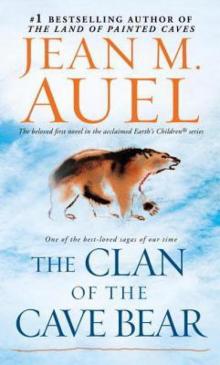 The Clan of the Cave Bear
The Clan of the Cave Bear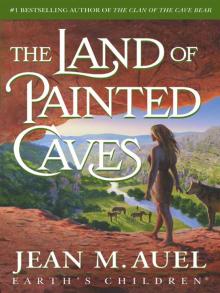 The Land of Painted Caves
The Land of Painted Caves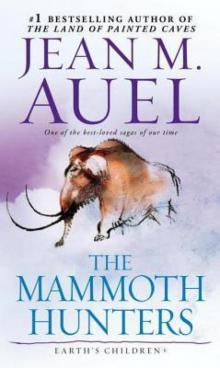 The Mammoth Hunters
The Mammoth Hunters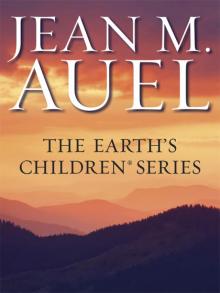 The Earth's Children Series 6-Book Bundle
The Earth's Children Series 6-Book Bundle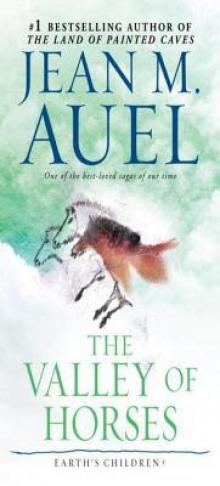 The Valley of Horses
The Valley of Horses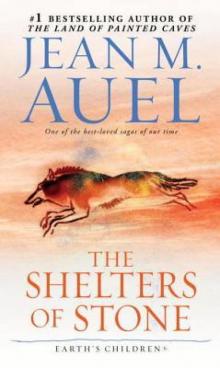 The Shelters of Stone
The Shelters of Stone The Clan of the Cave Bear ec-1
The Clan of the Cave Bear ec-1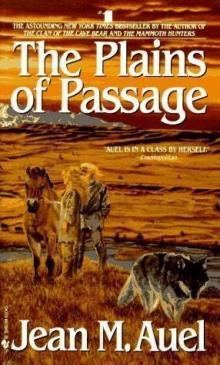 THE PLAINS OF PASSAGE ec-4
THE PLAINS OF PASSAGE ec-4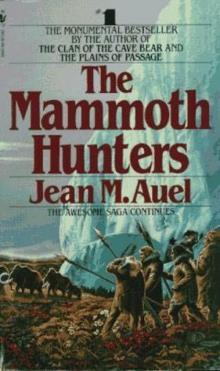 The Mammoth Hunters ec-3
The Mammoth Hunters ec-3 THE SHELTERS OF STONE ec-5
THE SHELTERS OF STONE ec-5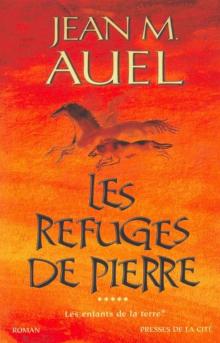 Les refuges de pierre
Les refuges de pierre![Earth's Children [02] The Valley of Horses Read online](http://i1.bookreadfree.com/i1/03/30/earths_children_02_the_valley_of_horses_preview.jpg) Earth's Children [02] The Valley of Horses
Earth's Children [02] The Valley of Horses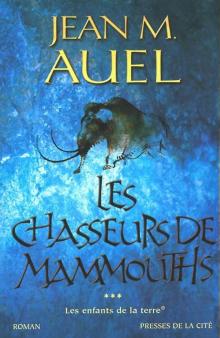 Les chasseurs de mammouths
Les chasseurs de mammouths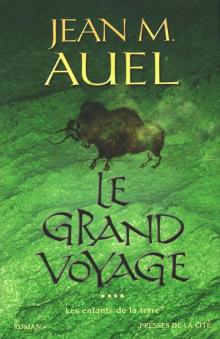 LE GRAND VOYAGE
LE GRAND VOYAGE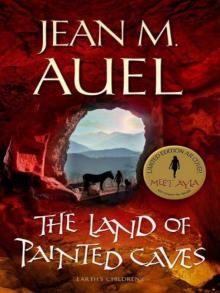 The Land of Painted Caves ec-6
The Land of Painted Caves ec-6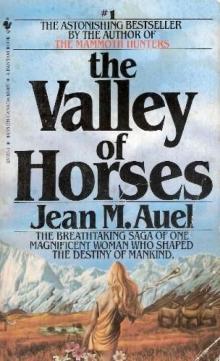 The Valley Of Horses ec-2
The Valley Of Horses ec-2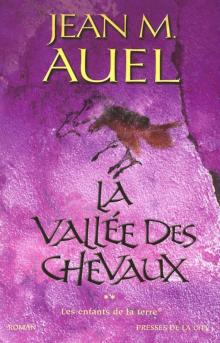 La Vallée des chevaux
La Vallée des chevaux